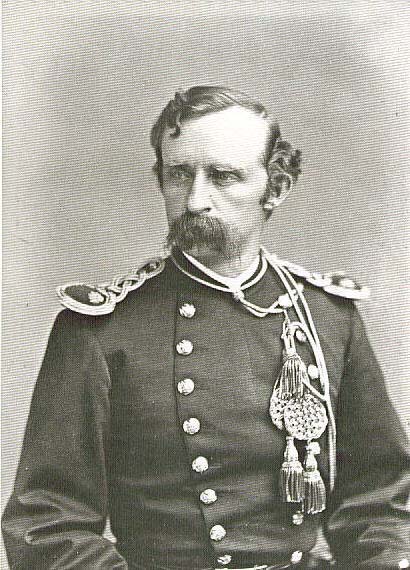Find three examples of names that need to be spoken aloud in order to catch the allusion. Discuss the examples as well as the reading technique that requires you to read aloud in order to make connections. Why does King want us to read aloud?
– Question 6

Lt. Col. George Armstrong Custer (LIBI Archives/Library)
George Morningstar
This character only catches my attention when I read aloud his description, the part that Latisha met him at the reserve: he was “wearing—tan cotton slacks, a billowy white cotton shirt that was loose in the body and tight at cuffs. He had on oxblood loafers and patterned socks” (132), and his signature “fringed leather jacket” (Page Number). These details of outfit much resemble the famous lieutenant General, George Armstrong Custer. Furthermore, a non-fiction book named Son of the Morning Star also made him as the subject, which coincided with his last name in GGRW— Morningstar.
Other than the above, his underestimation over the reaction towards his attendance in the Sun Dance, which ended up being dismissed by the Indians, too resembles his situation at the Battle of the Little Bighorn, where he too underestimated the native force, believing that he could overrun them at ease. He ended up being killed by the Indians.
Alberta Franklin
The first character that I paid attention after reading aloud would be Alberta Franklin. The name itself is obviously an allusion of the province of Alberta, but then I started wondering the reason behind King’s intention in mentioning Alberta. Bearing in mind that King constructs his story undergirding Canadian history, the deadliest landslide that took place in Frank, Alberta would mostly likely resembles the name of Alberta Franklin. The landslide took place on April 29th, 1903, where tonnes of rocks fell from the Peak of Turtle Mountain into the Crownset Valley River.
One reason that I believe King including this incident into his story would be because of the Native oral traditions that related to this landslide. It has been reported that the groups of native people living nearby, the Blackfoot and K’tunaxa, have oral traditions in referring the summit of Turtle Mountain as “the mountain that moves” (“The Frank”). Taking this into consideration, I think the intention for King to incorporate the incident into his story would probably be integrating oral culture into written culture, which is identical to the theme of the story: portraying oral culture in written form.
Dr. Joseph Hovaugh
I had a hard time in struggling how to pronounce “Hovaugh” and, could not even relate him to any other figure. Luckily, the clue was obvious when I started to read the dialogue of Dr. Hovaugh and Dr. Eliot in page 46. With Dr. Eliot calling Dr. Hovaugh “Joe,” I quickly correlate “Joe” and “Hovaugh” together and finally noticed that Dr. Joseph Hovaugh is created based on the biblical character, Jehovah.
After grasping the connection between Dr. Hovaugh and the Bible, King’s details started to make sense to me. To further illustrate their similarities, I would like to cite a narration of Dr. Hovaugh on page 16, and compare it with a passage drawn from the Book of Genesis.
“Dr. Hovaugh sat in his chair behind his desk and looked out at the wall and the trees and the flowers and the swans on the blue-green pond in the garden, and [he was pleased]. [emphasis added] (King 16)”
“I have provided all kinds of grain and all kinds of fruit for you to eat; but for all the wild animals and for all the birds I have provided grass and leafy plants for food” – and it was done. God looked at everything he had made, and [he was very pleased]. Evening passed and morning came – that was the sixth day. [emphasis added] (Genesis 1:27-31)”
God obviously plays a dominated role in the Bible, while Dr. Hovaugh too plays a dominated role over the four Native elders, which symbolizes control over the Native people in the story. From the above quotations, they both are conveyed through a tone of control and revealed their leading status over their people, which is the Native people in the case of Dr. Hovaugh.
By connecting God with Dr. Joseph Hovaugh (aka. Jehovah), I suspect that King intentionally build up this character to illustrate the desire of the predominating Christian European settlers in taking control over the land of the Natives through controlling their lives and land.
Works Cited
Frank Slide Interpretive Centre. The Frank Slide Story. 18 Mar. 2016, http://history.alberta.ca/frankslide/frankslidestory/frankslidestory.aspx. Accessed by 18 Jul 2016.